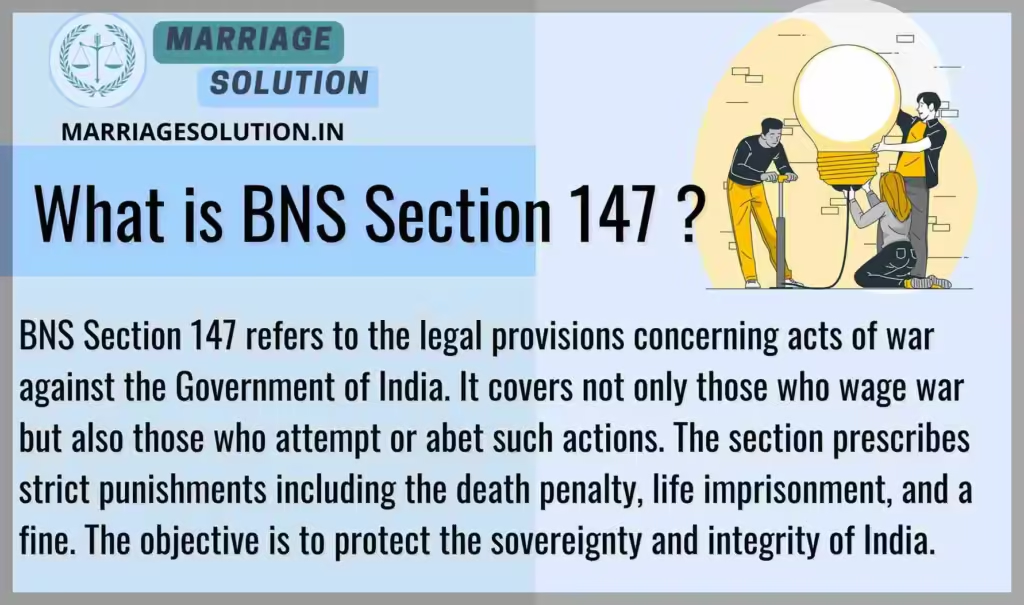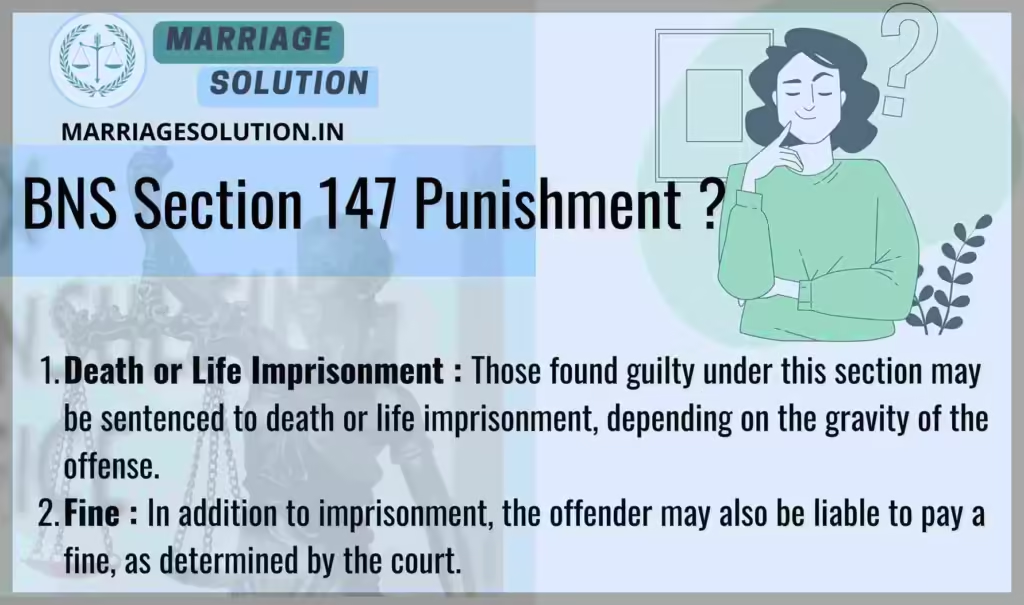Introduction of 147 BNS
147 BNS deals with one of the gravest crimes against the State — waging war, attempting to wage war, or abetting war against the Government of India. Such acts are seen as direct threats to national sovereignty and security. The law prescribes the death penalty or life imprisonment for offenders, underlining the seriousness of rebellion, insurrection, or violent uprisings against the Indian State.
The Bharatiya Nyaya Sanhita (BNS) Section 147 replaces the old Indian Penal Code (IPC) Section 121.
What is BNS Section 147 ?
BNS Section 147 refers to the legal provisions concerning acts of war against the Government of India. It covers not only those who wage war but also those who attempt or abet such actions. The section prescribes strict punishments including the death penalty, life imprisonment, and a fine. The objective is to protect the sovereignty and integrity of India.

Under Section 147 of the bns act 2023
Whoever wages war against the Government of India, or attempts to wage such war, or abets the waging of such war, shall be punished with death, or imprisonment for life, and shall also be liable to fine.
Section 147 punishes the gravest offense against the State — waging war, attempting to wage war, or abetting war against the Government of India.
- Waging War → Directly taking up arms or engaging in organized violent action against the Indian Government.
- Attempting to Wage War → Even if the war is not fully executed, preparations like gathering weapons, men, or resources make a person guilty.
- Abetting War → Financial support, supply of arms, strategic help, or encouragement to others to wage war is equally punishable.
- Punishment → Death penalty or life imprisonment, along with fine, reflecting the seriousness of the crime.
- Offense Classification:
- Cognizable → Police can arrest without a warrant.
- Non-bailable → Bail cannot be easily granted.
- Non-compoundable → Cannot be settled out of court.
- Trial by Court of Session → Heard only in higher courts due to the gravity of the offense.
Key Elements of Section 147
- Covers Waging, Attempting, and Abetting → Even indirect or incomplete involvement is punishable.
- Grave Punishment → Death or life imprisonment + fine.
- Protects Sovereignty → Ensures the security and integrity of India.
- National Security Focus → Prevents rebellion, insurrection, or armed uprisings.
- No Bail & No Compromise → Reflects the seriousness of the crime.
- Court of Session Trial → Ensures strict judicial oversight.
Examples of BNS Section 147
Example 1 – Attempt to Wage War:
A rebel group gathers weapons and plans an armed assault on Parliament but is caught before execution.
They are guilty under Section 147 (attempting to wage war).
Example 2 – Abetment of War:
A businessman secretly funds an insurgent organization with the aim of destabilizing the government.
He can be punished under Section 147 (abetting war).
Why Section 147 is Important
- Protects the Indian State from acts of rebellion, armed insurgency, or terrorism.
- Acts as a Strong Deterrent → Death or life imprisonment ensures offenders face the harshest consequences.
- Covers All Roles → Not only fighters, but planners, financiers, and supporters are equally guilty.
- Modernized Wording → Compared to IPC 121, BNS makes attempt and abetment coverage clearer.
Section 147 BNS Overview
BNS Section 147 of the Bharatiya Nyaya Sanhita deals with the crime of waging war, attempting to wage war, or abetting the waging of war against the Government of India. This section outlines serious legal consequences for anyone who either engages in war directly, supports it, or tries to initiate it. The primary punishment under this section is death or life imprisonment along with a fine. This law is crucial to protect national security and ensure the sovereignty of the country.
Section 147 BNS Overview :10 Key Points
- What Constitutes Waging War?
Waging war involves armed rebellion or violent action against the Government of India with the intent to overthrow or destabilize the government. - Attempt to Wage War:
A person is considered guilty of attempting to wage war if they make preparations, gather resources, or take any concrete steps toward starting a war, even if it’s not fully carried out. - Abetting War:
Anyone who helps, supports, or facilitates someone else’s efforts to wage war, either by providing money, supplies, or moral support, can be charged under this section. - Punishment for Waging War:
Those who are convicted of waging or attempting to wage war face the possibility of the death penalty or life imprisonment, underscoring the seriousness of this crime. - Fines in Addition to Imprisonment:
In addition to life imprisonment or death, the individual found guilty under this section may also be liable to pay a fine as per the court’s discretion. - Cognizable Offense:
A crime under BNS Section 147 is classified as cognizable, meaning the police have the authority to arrest the accused without a warrant if there is evidence of involvement in waging war. - Non-Bailable Offense:
This offense is non-bailable, meaning the accused cannot be easily released on bail. They remain in custody until the trial concludes unless the court grants special permission. - Tried by Court of Session:
Cases related to waging war are so serious that only a Court of Session is authorized to try them. The Court of Session handles high-profile and severe cases. - Illustration:
If an individual joins a group or organization that is actively involved in armed insurrection against the Government of India, that person can be charged under this section. - Non-Compoundable:
The offense of waging war is non-compoundable, meaning it cannot be settled between the parties outside of court. A legal trial is mandatory.
Examples for BNS Section 147
- Example 1:
A group of individuals plans to overthrow the Indian government by launching an armed rebellion. They gather weapons, recruit members, and make an attempt to attack government buildings. Although the attack fails, all those involved in planning and execution are arrested. They are charged under BNS Section 147 for attempting to wage war against the Government of India. - Example 2:
An individual funds an insurgent group that is planning an armed revolt against the government. Though the person is not directly involved in the fighting, they provide substantial financial support. Under BNS Section 147, they are charged with abetting the waging of war, as they have actively supported an attempt to destabilize the government.
BNS 147 Punishment
Death or Life Imprisonment:
Those found guilty under this section may be sentenced to death or life imprisonment, depending on the gravity of the offense.
Fine:
In addition to imprisonment, the offender may also be liable to pay a fine, as determined by the court.

BNS 147 bailable or not ?
No, BNS Section 147 is a non-bailable offense, meaning the accused cannot be granted bail as a matter of right and must remain in custody while awaiting trial unless the court finds exceptional reasons to grant bail.
Comparison – BNS Section 147 vs IPC Section 121
| Section | What it Means | Punishment | Bail | Cognizable? | Trial By |
|---|---|---|---|---|---|
| BNS Section 147 | Deals with waging, attempting to wage, or abetting war against the Government of India. Covers direct and indirect participation in rebellion or insurrection. | Death penalty or life imprisonment, along with a fine. | Non-bailable (bail not easily granted) | Cognizable (police can arrest without warrant) | Court of Session |
| IPC Section 121 (Old) | Earlier law punishing anyone who wages or attempts to wage war against the Government of India. Focused mainly on direct acts of rebellion. | Death penalty or life imprisonment, and fine (same as BNS). | Non-bailable | Cognizable | Court of Session |
BNS Section 147 FAQs
What is waging war under BNS Section 147?
Waging war refers to the act of using violence, force, or rebellion with the intent of destabilizing or overthrowing the Government of India.
What is the punishment for waging war against the Government of India?
The punishment includes either death or life imprisonment, along with a fine.
Can someone be punished for attempting to wage war?
Yes, attempting to wage war is also punishable under BNS Section 147, even if the war is not fully carried out.
Is BNS Section 147 a bailable offense?
No, this offense is non-bailable, meaning the accused cannot easily secure bail and must remain in custody during the trial.
Which court handles cases under BNS Section 147?
Cases related to BNS Section 147 are handled by the Court of Session, which has the authority to try serious offenses like waging war.
Conclusion
Section 147 of the BNS is a powerful safeguard for national security, ensuring that waging war or attempting to destabilize the Indian Government is dealt with utmost severity. Whether it is direct involvement in war, planning and attempting rebellion, or providing support and encouragement to insurgents — all are punishable with death or life imprisonment and fine. As a non-bailable, cognizable, and non-compoundable offense, it ensures strict enforcement and trial in the Court of Session. This section reinforces the principle that India’s sovereignty and integrity must remain inviolable.
Need Legal Support?
If you’re facing court proceedings, marriage-related issues, or any legal matter, our team at Marriage Solution – Lawyer Help is ready to guide you. Just complete our easy online enquiry form, and we’ll connect you with the right legal assistance tailored to your needs.
Finished with BNS 147 ? Continue exploring the next provisions of the Bharatiya Nyaya Sanhita (BNS), 2023. Each section includes explanations, examples, and plain-language breakdowns for easy understanding.
- BNS Section 148 : Conspiracy to commit offences punishable by section 147.
- https://marriagesolution.in/bns_section/bns-section-148/
- 149 BNS : Collecting arms, etc., with intention of waging war against the Government of India.
- https://marriagesolution.in/bns_section/149-bns/
- Section 150 BNS : Concealing with intent to facilitate design to wage war.
- https://marriagesolution.in/bns_section/section-150-bns/
- 151 BNS : Assaulting President, Governor, etc., with intent to compel or restrain the exercise of any lawful power.
- https://marriagesolution.in/bns_section/151-bns/
- Section 152 BNS : Acts endangering sovereignty unity and integrity of India.
- https://marriagesolution.in/bns_section/section-152-bns/
Full IPC Section List: https://marriagesolution.in/ipc-section-list
All Indian Law & Blogs: https://marriagesolution.in/indian-law/
Full BNSS Section List: https://marriagesolution.in/bnss_section-list
